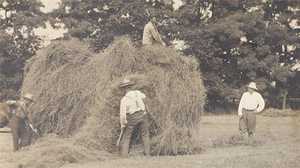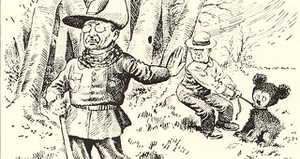Theodore Roosevelt's Time in Office
A selected chronology of American and major international events during Theodore Roosevelt's time in office.
1901
Edward VII becomes King of England, succeeding Queen Victoria
Cuba becomes a U.S. protectorate
Oil drilling begins in Persia, now Iran
President Roosevelt invites Booker T. Washington to dine at the White House, inciting white outrage across the South.

At the Pan-American Exposition in Buffalo, New York, anarchist Leon Czolgosz shoots President William McKinley. McKinley dies eight days later. Vice-President Theodore Roosevelt, at 42, becomes the youngest U.S. president.
Anthony F. Luchich drills at Beaumont, Texas, and taps a well that produces 110,000 barrels for oil per day. The Beaumont Field is now the biggest U.S. oil reserve known.
Financier J.P. Morgan buys out Andrew Carnegie and offers public stock in his newly-formed United States Steel Corporation. Morgan now commands 65% of the U.S steel manufacturing output and Carnegie is now the richest man in the world.
The second Hay-Pauncefote Treaty declares that the U.S has the right to build, own, and operate a canal across Central America.
Film producer walt Disney is born.
Alabama institutes literacy tests to discourage voting among African Americans.
Following the findings of Dr. Walter Reed, Dr. William C. Gorgas eradicates yellow fever from Havana by eliminating the mosquitoes that carry the disease.
Cutting edge entrepeneur, King C. Gillette start his safety razor company in Boston, Massachusetts.
Guglielmo Marconi sends the first wireless transmissions across the Atlantic from Newfoundland to Cornwall, Great Britain.
The first American Bowling Club tournament is held in Chicago.
Selected population figures: New York, 3.44 million; Los Angeles, 103,000; Dallas, 43,000.
1902
The Boer War ends in South Africa
Germany, Austria, and Italy renew their Triple Alliance for 6 years
Egypt opens the Aswan Dam
With the assistance of U.S. troops, Cuba casts off Spanish rule and becomes an independent republic.
Ida Minerva Tarbell publishes her serial "History of the Standard Oil Company," a negative portrait of John D. Rockefeller's company, in McClure's magazine.
The New York Herald premieres Buster Brown and his faithful dog Tige on its comic page.
Following Theodore Roosevelt's refusal to shoot a mother bear while on a hunting trip, stuffed toy "Teddy Bears" begin their ascent to childhood icon status. Children also favor Barnum's Animal Crackers, which debut in stores everywhere.
American consumers rally against outrageously high meat prices: 24 cents a pound for sirloin steak; 18 cents a pound for pork chops.
The Pepsi Cola Company is founded.
Synthetic fabric inventor Arthur D. Little makes a sow's ear into a silk purse.

1903
Britain conquers Northern Nigeria
King Alexander I and Queen Draga of Serbia are assassinated
The Russian Socialist Democratic Party splits into the Mensheviks and the Bolsheviks
Giuseppe Sarto becomes Pope Pius X
Anti-Jewish pogroms occur in Russia
Emmeline Pankhurst founds the National Women's Social and Political Union in Great Britain
In Boston, James Michael Curley and his brother Thomas are charged in a civil service cheating scandal.
Bicycle mechanics Orville and Wilbur Wright fly their gasoline-powered "Flyer I". On their longest run of the day, they travel 852 feet.
Food service worker "Typhoid Mary" Mallon creates a one-person typhoid epidemic in New York City. More than 1000 cases are traced back to her.
More than 600 people die in a fire at Chicago's Iroquois Theater.
Nationwide, listeners thrill to popular hits "Sweet Adeline" and "Waltzing Matilda."
The Boston Red Sox win the first World Series, beating Pittsburgh 5 games to 3.
To protect birds from plume hunters, Theodore Roosevelt creates a national Wildlife Refuge at Pelican Island in Florida.
Milton Hershey begins building his chocolate empire at Derry Church, PA. The town will later be known as Hershey.
The Great Train Robbery, considered the first moving picture with a plot, premieres. Created by Edison Studios, its running time: 12 minutes.
1904
The Russo-Japanese War begins
Colombia becomes a dictatorship under Rafael Reyes
The 10-hour work day becomes law in France
Hereros and Hottentots revolt in German Southwest Africa
After promising a square deal for the American people, Theodore Roosevelt defeats Democrat Alton B. Parker to secure his first and only elected term as president.
Jack London publishes his adventure novel, The Sea Wolf.
Angered by Russian occupation of Manchuria and Korea, Japan attacks Russia, then declares war. Modern weapons such as torpedoes, land mines, and machine guns premiere during the conflict, which will end 19 months later.
The Supreme Court rules 5-4 to dissolve the Northern Securities Company.
Dr. William Gorgas travels to Panama, hoping to eradicate the yellow fever that has caused thousands of deaths among French, Caribbean, and American canal workers.
On Broadway: Little Johnny Jones, which features the George M. Cohan songs Give My Regards to Broadway and Yankee Doodle Boy.
Pitching for the Boston Red Sox, Cy Young tallies the first perfect game in the history of American-League Baseball.
1905
The Russo-Japanese War ends
Greeks in Crete revolt against the Ottoman Empire
The Norwegian parliament votes to separate from Sweden
The Sinn Fein party is founded in Dublin
Albert Einstein develops the special theory of relativity
Theodore Roosevelt helps Russia and Japan reach a peace agreement at a conference at Portsmouth, NH. He will receive the Nobel Prize for Peace in 1906 for his role as mediator.
Black intellectuals led by W.E.B. DuBois meet at Fort Erie, New York, forming the Niagara Movement to promote racial equality.
Charles M. Schwab founds the Bethlehem Steel Company.
The first Nickelodeon opens in Pittsburgh, PA.
Photographers Alfred Steiglitz and Edward Steichen open Gallery 291 in New York.
George Bernard Shaw's play Mrs. Warren's Profession premieres in New York. Mrs. Warren makes her living as a brothel madam. The actors are prosecuted on morals charges but are acquitted.
1906
The Algeciras Conference gives France and Spain control of Morocco
Turkey is forced to cede the Sinai Peninsula to Egypt
U.S. troops occupy Cuba
Self-government is granted to the Transvaal and Orange River colonies in what will become South Africa
Night-shift work for women is forbidden internationally
President Roosevelt dismisses three companies of black infantry troops after several of the soldiers are accused of shooting at the citizenry in Brownsville, Texas. Little evidence supports the accusations. The Army will reverse this decision in 1972, changing the men's discharges to honorable.
A U.S contingent under Chief Engineer John Findley Wallace commences work on the Panama Canal.
Upton Sinclair's The Jungle details shockingly unsanitary conditions in the American meat-packing industry. The book incites a public and political uproar.
A violent earthquake strikes San Francisco. Natural gas lines break and huge fires sweep the city. More than 500 people die; $400 million in property is destroyed.
U.S. Pure Food and Drug Act and a new meat inspection amendment are approved by the House and signed into law.
Roosevelt makes the first ever trip abroad by a sitting U.S. president, visiting Central America to observe construction of the Panama Canal.
1907
Universal suffrage is enacted in Austria
The Emperor of Korea abdicates -- Korea becomes a Japanese protectorate
The Dutch occupy Sumatra
New Zealand becomes part of the British Empire
The U. S. admits Oklahoma as the 46th state.
The New York Stock Exchange collapses. A run on banks is stopped when J.P. Morgan and John D. Rockefeller provide direct cash infusions. Roosevelt's approval of a merger between U.S. Steel and the Tennessee Coal, Iron and Railroad Company reassures investors.
Cartoonist Rube Goldberg, who will become famous for his ridiculous drawings of imaginary machinery, begins his professional cartooning career.
When she appears in a one-piece skirtless bathing suit at Boston's Revere Beach, Annette Kellerman is arrested.
R.J. Reynolds puts Prince Albert in a can, then sells him to pipe smokers across the nation.
Despite protests from Congress, President Roosevelt sets aside 16 million acres of new forest preserves with a presidential proclamation.
The first of Ziegfeld's famous follies premieres in New York.

1908
Austria occupies Bosnia and Herzegovina
King Carlos I and the crown prince of Portugal are assassinated
Crete proclaims union with Greece
The Union of South Africa is established
The Dutch take over Bali
Tzu-Hsi, the empress of China, dies
Abdul Hafid is proclaimed Sultan of Morocco
The Department of Justice's newly-formed Federal Bureau of Investigation opens for business in Washington.
Race riots inflame Springfield, Illinois.
William Knox D'Arcy strikes oil in the Middle East in what will later be recognized as the largest oil reserve in the world.
Jack Johnson becomes the world's first black heavyweight boxing champion.
J.C. Penney founds his chain of department stores.
Ford introduces its Model T, which retails for $850.50. Consumers can choose one color — black.
Orville and Wilbur Wright sign a contract which makes them the first-ever producers of planes for the U.S military.
Contestants compete in the first New York-Paris auto race. The drivers travel by boat across the Pacific; the winner takes 169 days to complete the trip.
Children enjoy novels The Wind in the Willows by Kenneth Grahame, and Anne of Green Gables by Lucy Maud Montgomery.
Theodore Roosevelt creates Muir Woods National Monument and Grand Canyon National Monument. He also convenes a special White House Conference on Conservation to stress the importance of protecting natural areas.
Samuel Gompers, John Mitchell, and Frank Morrison of the American Federation of Labor are sentenced to prison for violating a court injunction against boycotting Buck's Stove and Range Co.
Henri Matisse exhibits at Stieglitz' Gallery 291 in New York. The Eight, including George Luks and John Sloan, form what will be known as the Ash Can school of American realistic painting.
1909
U.S Marines overthrow the Nicaraguan government. Dr. José Madriz is named new president of the Central American nation.
Military expert Homer Lea, an American, publishes The Valor of Ignorance, in which he predicts that Japan will become an aggressive military power and will open a war with the U.S. by attacking Hawaii.
W.E.B Dubois heads the newly founded National Association for the Advancement of Colored People. Educator John Dewey is among the prominent supporters of the organization.
20,000 members of the International Ladies' Garment Workers Union begin a strike which will eventually be settled in their favor.
Robert E. Peary reaches the North Pole. Upon his return he discovers Fredrick A. Cook has made an earlier claim. Cook's claim is contested and in the end Peary is credited as the first man to reach the North Pole. Peary's claim will be disputed in 1980, but he holds onto the title.
Chemist Leo Baekeland invents the world's first plastic polymer. Bakelite will be used in numerous industrial and consumer productions, from electrical insulation to jewelry.
Congress proposes the sixteenth amendment authorizing an income tax.
D.W. Griffith introduces film star Mary Pickford.
The actress Helen Hayes debuts on Broadway, age 9.
President Theodore Roosevelt finishes his second and final term. Shortly thereafter, he departs on an African safari.
Setting an example which other states will soon follow, Delaware forbids employment of children under the age of 14.
President Taft sets aside 3 million acres of oil-rich land for conservation purposes. Including land in Teapot Dome, Wyoming, a location that will gain infamy during the Harding Administration.








